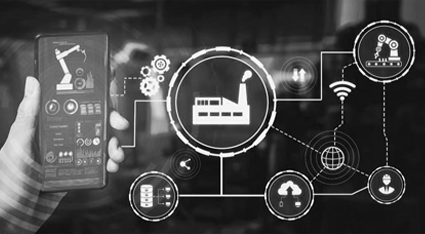The Enterprise AI Challenge
How do you scale generative AI throughout your organization? You must accomplish this without jeopardizing security or governance. This is a vital question for every technology leader. They are navigating the AI transformation while preserving control of sensitive company data.
Microsoft Azure’s generative AI platform offers the answer. It provides enterprise-grade AI with built-in security, compliance, and scalability. For CTOs and CIOs, Azure transforms experimental AI projects into strategic assets. These assets drive measurable business value.
What Makes Azure’s Generative AI Different
Azure OpenAI Service is more than just access to GPT-4; it’s an end-to-end enterprise framework that solves some very important issues in model deployment:
- Data Security: Your data stays in your security perimeter and never trains external models.
- Enterprise Reliability: SLA-backed performance with dedicated capacity for mission-critical applications
- Seamless Integration: Pre-built connectors to Microsoft 365, Dynamics 365, and Azure services
- Cost Control: Predictable consumption-based pricing with reserved capacity options
- Built-in Governance: Content filtering, abuse monitoring, and comprehensive audit logging
Think of it as a secure, private highway for your AI operations versus conducting sensitive business on public infrastructure.
Core Architecture Components
Azure’s layered architecture separates concerns while maintaining seamless integration:
- Foundation Layer: We deploy Azure OpenAI Service within your Virtual Network (VNet). We use private endpoints for secure access. Azure AD authentication manages user access. Regional deployment ensures your data residency requirements are met.
- Data Integration Layer: This layer uses Azure AI Search. It implements Retrieval-Augmented Generation (RAG). This technique grounds the AI’s responses in your actual business data. The results are specific and accurate, not based on generic training data.
- Application Layer: You have two options for building applications. Use Copilot Studio to create low-code solutions. Or build custom applications that call Azure OpenAI directly through its APIs.
- Governance Layer: Azure Policy is used to enforce organizational standards. Microsoft Purview tracks and governs sensitive data. Azure Monitor provides real-time visibility into system performance and health.
Key Business Benefits
Accelerated Time-to-Value: Deploy AI capabilities in weeks, not months. A manufacturing enterprise implemented AI-powered customer service in 45 days versus the 6-month timeline of competitors quoted.
Enterprise Security Without Trade-offs: Built-in security controls operate at an infrastructure level without adding latency. A financial firm reduced security approval from 3 months to 3 weeks.
Elastic Scalability: Auto-scaling handles unpredictable demand. A retail organization’s AI engine handled a 400% traffic spike during product launch without manual intervention.
Reduced Integration Complexity: Unified identity, monitoring, and cost allocation across AI and traditional infrastructure reducing operational overhead by 60% for one healthcare organization.
Real-World Success Stories
Finance Operations: Manufacturing company reduced month-end close from 12 days to 4 days using Azure Document Intelligence with Azure OpenAI for intelligent document processing. Error rates dropped 78%, freeing 200+ hours monthly.
Sales Intelligence: A Software company built a Dynamics 365-integrated Copilot that increased sales productivity by 35% by automating meeting notes, CRM updates, and competitive intelligence, reducing the sales cycle by 22%.
HR Self-Service: 5,000-employee organization resolved 65% of routine inquiries without human involvement, reducing response time from 36 hours to immediate and freeing 15 hours weekly for strategic HR initiatives.
4-Phase Implementation Roadmap
Phase 1: Assessment (4-6 weeks)
- Identify 2-3 high-value use cases with clear metrics
- Establish AI governance committee
- Deploy Azure landing zone with network segmentation
- Configure security baseline policies
Phase 2: Pilot Development (6-8 weeks)
- Provision Azure OpenAI Service
- Implement RAG pattern with Azure AI Search
- Develop application interface
- Establish monitoring and cost tracking
Phase 3: Production Deployment (4-6 weeks)
- Implement CI/CD pipelines
- Configure autoscaling and high availability
- Deploy comprehensive monitoring with alerting
- Integration testing with enterprise systems
Phase 4: Optimization (Ongoing)
- Analyze usage patterns for optimization
- Collect user feedback to refine responses
- Identify additional use cases
- Monitor and optimize costs
The Strategic Imperative
Organizations that successfully scale generative AI gain significant competitive advantages. They see improvements in efficiency, customer experience, and innovation velocity. However, those that delay face widening capability gaps.
Azure provides an enterprise-grade platform for secure and compliant AI deployment. But success requires more than just the platform. It also needs expert implementation, strong change management, and proven methodologies.
Partner with UCS for Azure AI Success
UCS specializes in enterprise AI implementations on Azure. We help organizations move from initial use case identification to full production deployment and optimization. Our team has deep experience across fintech, manufacturing, supply chain, and enterprise operations. This expertise helps us deliver proven patterns instead of costly trial-and-error.
We are currently helping a manufacturing unit bring operational efficiency to them.
Start Your AI Journey Today
- Assessment: Schedule a 60-minute AI readiness consultation
- Pilot Planning: Develop detailed implementation plan with success metrics
- Expert Implementation: Deploy with proven Azure AI methodologies
The question isn’t whether your organization will adopt enterprise generative AI; it’s whether you’ll lead or follow.
Conclusion
Scaling generative AI isn’t just a technology upgrade. It is a strategic shift that determines how fast your enterprise can innovate and optimize operations. It also influences how effectively you can compete in a rapidly evolving market.
Azure provides an enterprise-grade foundation to deploy AI with built-in security, governance, and performance. But having the right platform alone isn’t enough. Success requires expert implementation and a structured approach to adoption. It also demands a clear roadmap aligned with real business outcomes.
UCS accelerates your AI journey with proven Azure deployment methodologies. We use industry-specific frameworks tailored to enterprise needs. Our team provides hands-on execution from pilot projects to full-scale rollout. Whether you’re improving customer experience, automating workflows, or unlocking new revenue models, we support every stage. We help you turn generative AI into a measurable competitive advantage.
Contact UCS To begin your strategic AI transformation on Azure.







